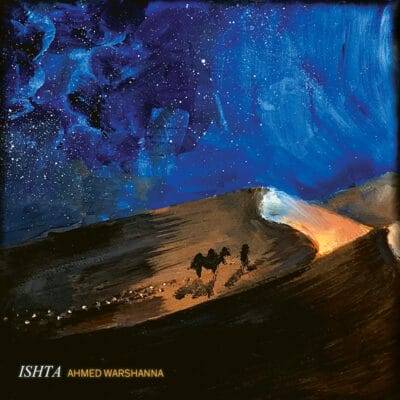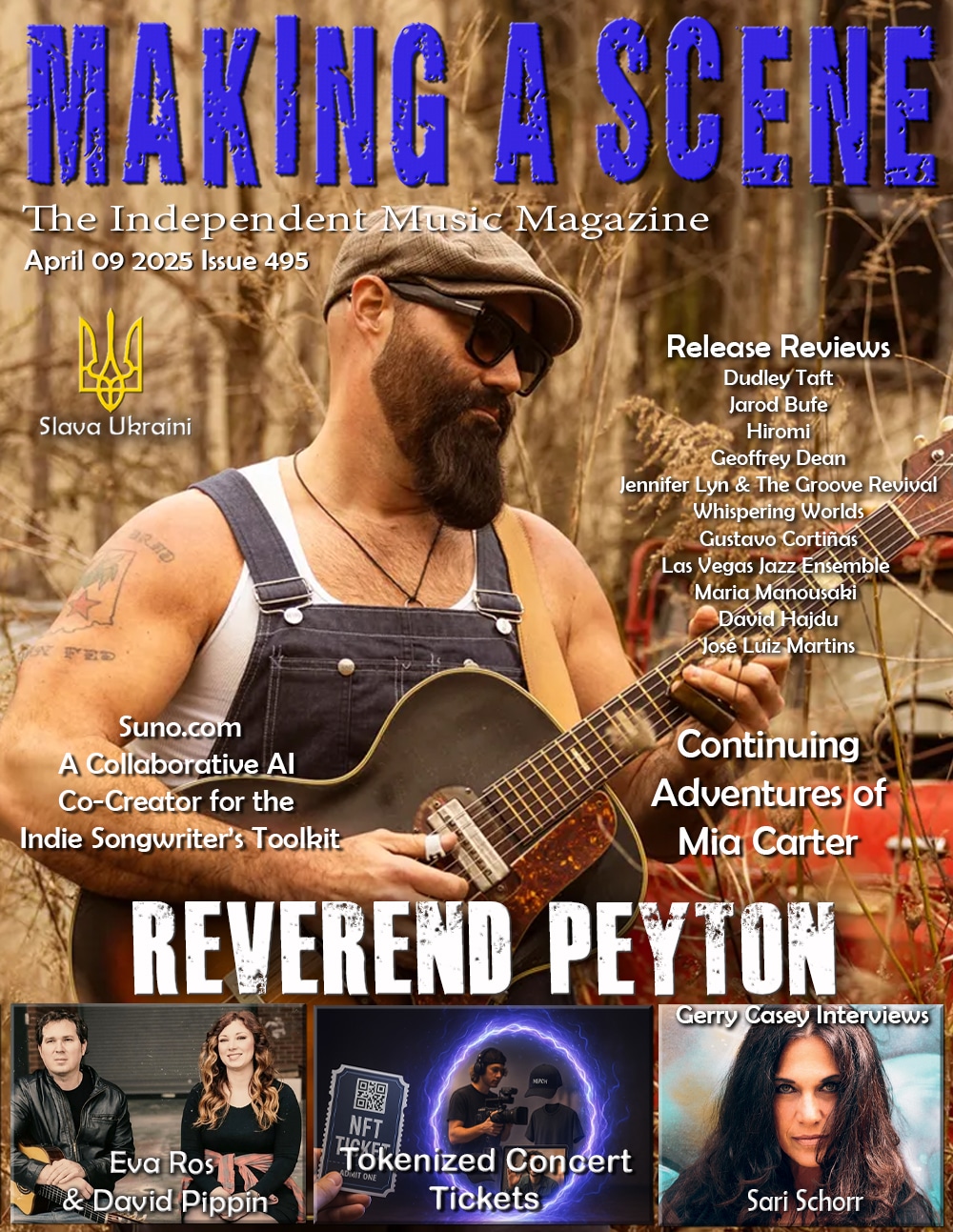Ahmed Warshanna Ishta
 Ahmed Warshanna
Ishta
Tiber River
Ahmed Warshanna is an artist to watch, hailing from Baltimore and leading a septet that combines the western music of jazz with the eastern music of Egypt. Warshanna is a recent graduate of the University of Maryland Baltimore County where he received a Music Achievement Award in 2020. Warshanna is a guitarist, leading a local group of players that include Hart Guonjian-Petit (trumpet), Dominic Ellis (tenor sax), Daniel Sperlein (trombone) Josh Miller (piano), Thomas Owens (bass) and Charlie Seda (drums) – the classic Art Blakey & Jazz Messengers configuration although the music heads in a different direction, less swinging and with a new set of harmonics and palettes.
Warshanna gives much more room for his bandmates than the usual soloist in these five selections. While his guitar is prominent throughout, especially in the opening “Inty Omry” he knows when to lay out, and the fierce statements from all three horns color the second piece, “Alf Leila.,” a great marriage of Egyptian harmony and some postbop due to Gounjian-Petit’s muted trumpet. These are some different rhythm patterns than we’re accustomed to hearing in American jazz but the leader’s penchant for composers such as Wayne Shorter, Cedar Walton, John Coltrane, and Kenny Burrell provide plenty of threads of familiarity to keep us engaged. His guitar tone is bright and note driven at times in even a bluesy way. These first two are inventive arrangement of works by Umm Kulthum the influential Egyptian composer and contralto.
The album was composed for his mother, half of the Egyptian-American parent team that raised him. He watched his mother suffer through treatments for breast cancer. Inspired, he fuses hardbop and postbop of the ‘60s (the piano strains of “Samaka” evoke Cedar Walton for example) in this popular Egyptian children’s song that he remembers singing with his mother as a child. His parents emigrated to the states in the late ‘80s and exposed him to their favorite artists, Umm Kulthum, Fairuz, and Abdel Halim Hafez. He became as equally inspired from their music as from the American masters mentioned. As a note, post recording Shawanna’s mother passed away, as mentioned in the liners.
“Azra” is an original, a contemplative, ballad played more in the mode of a guitar-piano-bass-drums quartet, giving an intent focus on Warshanna’s flowing guitar lines and terrific interplay with his rhythm section. It keeps building until he yields to pianist Miller and who shimmers to Warshanna’s comping before the piece fades quietly, emerging to conclude on a set of powerful chords – all in, an extraordinary piece. The horns return for the haunting closing title track, which features some dark chords and the kind of vibe found in some of Wayne Shorter’s work. Ellis delivers an excellent articulate solo that seques into Warshanna’s emphatic statement, again building tension with notes that mesh beautifully with Miller’s piano before the latter assumes the lead, extending the drama before the two rejoin in extensive conversation that melts into Owens’ poignant bass excursion. The horns re-enter in ensemble, with all members closing the tune in a fitting, booming climax.
It’s great to be surprised. While the meshing of American jazz and Egyptian popular music may seem off-putting, this music is highly accessible with the writing intriguing and impactful. Warshanna is one to watch.
Ahmed Warshanna
Ishta
Tiber River
Ahmed Warshanna is an artist to watch, hailing from Baltimore and leading a septet that combines the western music of jazz with the eastern music of Egypt. Warshanna is a recent graduate of the University of Maryland Baltimore County where he received a Music Achievement Award in 2020. Warshanna is a guitarist, leading a local group of players that include Hart Guonjian-Petit (trumpet), Dominic Ellis (tenor sax), Daniel Sperlein (trombone) Josh Miller (piano), Thomas Owens (bass) and Charlie Seda (drums) – the classic Art Blakey & Jazz Messengers configuration although the music heads in a different direction, less swinging and with a new set of harmonics and palettes.
Warshanna gives much more room for his bandmates than the usual soloist in these five selections. While his guitar is prominent throughout, especially in the opening “Inty Omry” he knows when to lay out, and the fierce statements from all three horns color the second piece, “Alf Leila.,” a great marriage of Egyptian harmony and some postbop due to Gounjian-Petit’s muted trumpet. These are some different rhythm patterns than we’re accustomed to hearing in American jazz but the leader’s penchant for composers such as Wayne Shorter, Cedar Walton, John Coltrane, and Kenny Burrell provide plenty of threads of familiarity to keep us engaged. His guitar tone is bright and note driven at times in even a bluesy way. These first two are inventive arrangement of works by Umm Kulthum the influential Egyptian composer and contralto.
The album was composed for his mother, half of the Egyptian-American parent team that raised him. He watched his mother suffer through treatments for breast cancer. Inspired, he fuses hardbop and postbop of the ‘60s (the piano strains of “Samaka” evoke Cedar Walton for example) in this popular Egyptian children’s song that he remembers singing with his mother as a child. His parents emigrated to the states in the late ‘80s and exposed him to their favorite artists, Umm Kulthum, Fairuz, and Abdel Halim Hafez. He became as equally inspired from their music as from the American masters mentioned. As a note, post recording Shawanna’s mother passed away, as mentioned in the liners.
“Azra” is an original, a contemplative, ballad played more in the mode of a guitar-piano-bass-drums quartet, giving an intent focus on Warshanna’s flowing guitar lines and terrific interplay with his rhythm section. It keeps building until he yields to pianist Miller and who shimmers to Warshanna’s comping before the piece fades quietly, emerging to conclude on a set of powerful chords – all in, an extraordinary piece. The horns return for the haunting closing title track, which features some dark chords and the kind of vibe found in some of Wayne Shorter’s work. Ellis delivers an excellent articulate solo that seques into Warshanna’s emphatic statement, again building tension with notes that mesh beautifully with Miller’s piano before the latter assumes the lead, extending the drama before the two rejoin in extensive conversation that melts into Owens’ poignant bass excursion. The horns re-enter in ensemble, with all members closing the tune in a fitting, booming climax.
It’s great to be surprised. While the meshing of American jazz and Egyptian popular music may seem off-putting, this music is highly accessible with the writing intriguing and impactful. Warshanna is one to watch.
- Jim Hynes
Discover more from Making A Scene!
Subscribe to get the latest posts sent to your email.














































